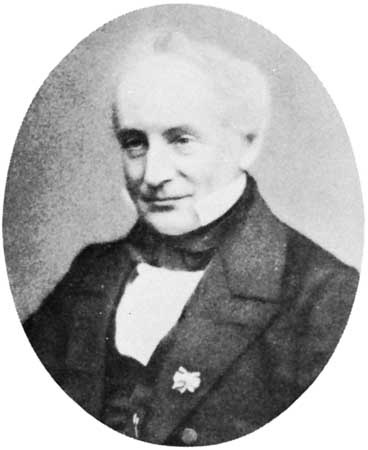Bopp, Franz
German philologist
born Sept. 14, 1791, Mainz, archbishopric of Mainz 【Germany】
died Oct. 23, 1867, Berlin, Prussia 【Germany】
 German linguist who established the importance of Sanskrit (Sanskrit language) in the comparative (comparative linguistics) study of Indo-European languages and developed a valuable technique of language analysis.
German linguist who established the importance of Sanskrit (Sanskrit language) in the comparative (comparative linguistics) study of Indo-European languages and developed a valuable technique of language analysis.Bopp's first important work, Über das Conjugationssystem der Sanskritsprache . . . (1816; “On the System of Conjugation in Sanskrit . . .”), foreshadowed his major achievement. In it he sought to trace the common origin of Sanskrit, Persian, Greek, Latin, and German, a task never before attempted. Concentrating on a historical analysis of the verb, he assembled the first trustworthy materials for a history of the languages compared. In 1820 he extended the study to include the other grammatical parts.
Professor of Oriental literature and general philology at the University of Berlin (1821–67), Bopp published a Sanskrit grammar (1827) and a Sanskrit and Latin glossary (1830). His chief activity, however, centred on the preparation of his great work in six parts, Vergleichende Grammatik des Sanskrit, Zend, Griechischen, Lateinischen, Litthauischen, Altslawischen, Gotischen und Deutschen (1833–52; “Comparative Grammar of Sanskrit, Zend, Greek, Latin, Lithuanian, Old Slavic, Gothic, and German”). In this work he attempted to describe the original grammatical structure of the languages, trace their phonetic laws, and investigate the origin of their grammatical forms. He also produced a number of monographs, including studies of several European language groups, papers on the relation of the Malayo-Polynesian (Austronesian) and Indo-European languages (1840), and on the accent in Sanskrit and Greek (1854).
- Mansfeld, Ernst, Graf von
- Mansfield
- Mansfield, Arabella
- mansfieldite
- Mansfield, Katherine
- Mansfield, Michael
- Mansfield, Mount
- Mansfield, Richard
- Mansfield, Sir Peter
- Mansfield, William Murray, 1st Earl of, Earl Of Mansfield, Baron Of Mansfield, Lord Mansfield
- Manship, Paul
- mansion
- Mansion House
- manslaughter
- Manson, Charles
- Manson, Sir Patrick
- Manstein, Erich von
- Mansôa
- Manta
- manta ray
- Mantegna, Andrea
- mantel
- Mantell, Gideon Algernon
- Manteuffel, Edwin, Freiherr (baron) von
- Manteuffel, Hasso, Freiherr von